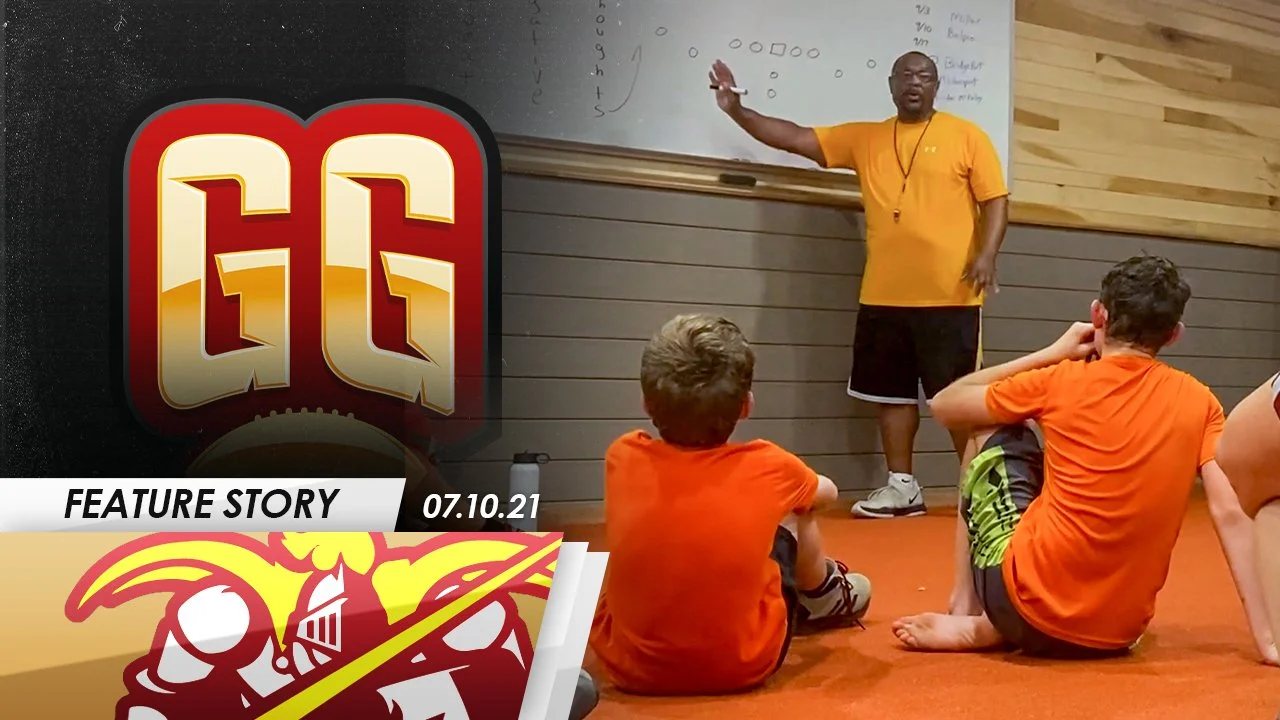NEWS FEATURES
STEWART, Ohio — For years, Federal Hocking high school has struggled to field a full roster of players. Many kids were playing nearly every snap on both offense and defense. As a result, since 2015, the former TVC-Hocking competitors have a combined record of 3-55.
By 2019, things had become troubling for players and fans alike. After six games, the roster had suffered so many injuries that the team was forced to forfeit the remainder of the season.
Then, in 2020, the team left the Tri-Valley Conference in favor of matchups with smaller schools. Despite picking up two wins, the team once again had to cancel at least one game due to injuries.
The 2021 season brought new hope for Fed Hock faithful. New head coach Brad Woodson was committed to building a more positive locker room culture. He established a collaboration with the middle school team to ensure a more seamless transition into the high school schemes. Although the Lancers finished the season winless, the team’s roster was large enough to complete their entire schedule — which was Woodson’s foremost goal for the year.
But now, things have taken a turn for the worse.
Just two weeks before kickoff, the Federal Hocking Lancers have forfeited their entire schedule.
“We did not have enough players for a team for middle school or high school football this year,” athletic director Stephanie Evans said.
The decision comes a couple of weeks after the latest Federal Hocking school board meeting, during which the board announced the resignation of Woodson.
Former Belpre coach Lance Binegar was hired to fill the position. But now, the future of the entire Federal Hocking football program is in question.
“We plan to start working now to rebuild and increase numbers with the hopes of fielding a team next year,” Evans said.
Federal Hocking cancels 2022 football season over roster concernS
AUGUST 9, 2022
ONE YEAR EARLIER:
New Federal Hocking Football Coach Hopes To Strengthen Program Durability
For many teams, week six of the 2019 high school football season was just another Friday night under the lights.
But for the Federal Hocking Lancers, it would be their last.
The team had struggled to field a full roster for years, but that night marked a low point for the Lancers. A string of injuries reduced their lineup to so few players that they would have to forfeit the rest of that season’s games.
“I felt like it wasn’t fair to anybody — the coaches, the staff, the people that are our supporters, just everybody,” Federal Hocking rising senior Chase Hogsett said.
READ MORE
Crumbling Track At Alexander Puts Athletes, Entire Program At Risk
Fourteen years after its construction, the running track at Alexander High School is still occupied by student athletes. But the coat of black rubber is showing its age; in fact, it has been for years.
Athletes and parents spoke out at Wednesday’s school board meeting. They say it’s time for an upgrade.
“Our track is undeniably unsafe for athletes to properly practice on, causing athletes to not be at their full potential when it comes to the day of the meet,” said Brianna Wallace, an Alexander graduate.
Breaks and cracks plague the entire Alexander track. During the season, standing water, mud and even ice make their homes in holes along the runway.
READ MORE
For Many Vinton County Residents, Only Source Of Clean Water Is Outside The Home
Nearly a third of Vinton County residents are living without reliable access to clean water — whether to drink, to cook, or even to bathe.
“And the ones that do have water, it’s like dirt, it’s like a muddy water,” County Commissioner Mark Fout said.
It’s not a new problem either.
“The quest for clean water for Vinton County has been with my family for 21 years and that was the first time that we moved here,” local resident James Satory said.
Federal funding has allowed Vinton County to place multiple water dispensaries throughout the county.
READ MORE
Ohio Legislature Finalizes Reform To School District Evaluation System
The Ohio Legislature passed an ambitious education bill despite a transformative amendment introduced midway through the bill’s life cycle.
Ohio House Bill 82, originally introduced to revise standardized test requirements, will now remedy longtime complaints about the state’s school district evaluation system.
The bill’s initial provisions remain intact, however. It will allow high school juniors to opt out of the annual state-funded ACT exam and remove the state’s ACT/SAT graduation requirement starting with the class of 2023.
The issue stems from students not planning to attend college blowing off a test they did not need to take.
READ MORE
Athens School District Hopes To Improve Equity And Accessibility With New Buildings
For decades, the Athens City School District comprised several elementary schools that each served a distinct sector of the community. But that will soon no longer be the case.
Construction crews are putting the finishing touches on two state-of-the-art facilities for Athens elementary students. The new Morrison-Gordon and East elementary schools will house students from pre-K through third grade beginning Aug. 25.
The project marks the launch of a district-wide consolidation, which will channel students into fewer yet larger school buildings to ensure the most efficient use of educational resources.
READ MORE
New Lexington Football Provides Small Teams With More Experience
High school football is at the heart of fall in Southeast Ohio.
But the smaller schools in our region have a hard time competing with larger teams. There just aren’t enough players on the roster to challenge varsity lineups in practice.
That was the case for the New Lexington Panthers.
“We’ve got a roster of about 43, so our [starters] are going against freshmen and sophomores,” head coach Kevin Board said.
This year, Board wanted to change that. Nearly a dozen schools are traveling to Perry County this month for the New Lexington seven-on-seven summer league.
READ MORE
Week 8 Playoff Scenarios:
How every Gridiron Glory team can reach the postseason
october 5, 2022
Only three weeks remain in the 2022 regular season — which means each team has three more opportunities to take the field, add to the win column, and secure enough playoff points for a berth in the postseason.
For the second year in a row, 16 teams will qualify for each of the OHSAA’s 28 regional tournaments, for a total of 448 playoff teams statewide. Teams who finish in the top 8 of their regions will play at home in the first round, and teams who finish in the top 4 will also receive second-round home games. Matchups are played at neutral sites beginning with the regional semifinals in Week 13.
Across the nine football conferences covered by Gridiron Glory, approximately 90 teams are still in the running for a Week 11 matchup. These are the scenarios in which each team, sorted by conference, can earn a spot in the 2022 playoffs.
A special thanks to Drew Pasteur for all projections and playoff probabilities, and to Joe Eitel for tracking the unofficial current seeding of each team.
READ MORE
Multimedia output
THE MOST EXHAUSTED BAND IN THE LAND
A COMPREHENSIVE ACCOUNT OF THE MARCHING 110 INVESTIGATION
Photo via Ohio University Marching 110 / marching110.com
APRIL 27, 2020
ATHENS, Ohio — Ohio University lifted the cease and desist on the Marching 110 on March 2 after nearly five months of restrictions. Following a wave of hazing allegations against student groups, the band was the second to last organization to learn of its investigation outcomes.
According to the executive summary from the Office of Community Standards and Student Responsibility, investigators identified unsanctioned traditions and concerning behaviors within the band, particularly in specific sections. None of those behaviors, however, caused physical harm to students.
Initial incident reports filed to CSSR included allegations of alcohol use and distribution, violence and coercive behavior, according to Taylor Tackett, director of the CSSR. The six reports filed throughout fall semester prompted a limited cease and desist on the band Oct. 10 — the Thursday before homecoming.
Allan Dalton, a former band manager who graduated after fall semester, reflected on how the decision’s timing affected the historically festive weekend.
“It was very dark, very solemn — it was like the Grinch stole Christmas that week,” Dalton said over a video call. “During homecoming, there are dozens, if not more, band families that get together. They get to meet their grandlittles, their great-great-grandlittles, and share stories … [Freshmen] were denied that experience this year, they don’t know their family trees.”
A limited cease and desist meant the band could still meet for supervised practices and performances, as those are university-sanctioned and carry academic credit for students. However, the duration of the suspension was far from limited; almost two months passed before the investigation formally began. Tackett noted the unprecedented number of misconduct reports during fall semester as a factor.
“CSSR has four staff members that serve as lead investigators and oversee this process; we facilitated 17 investigations in about eight weeks,” Tackett wrote in an email. “We weighed many factors when determining the order of investigations … Because of the size and scope of the [Marching] 110 organization, we scheduled them to be investigated last.”
Yet those details were unknown to band members, prompting a sentiment that students were being indirectly punished by a perceived sluggishness from CSSR.
“We didn’t hear anything for months, until the week before finals — one of the most stressful weeks of the entire semester — when they decided that they were going to actually do the investigation,” Dalton said. “The fact that they completely restricted all social, outside-of-band events to zero during the entire time was really frustrating.”
According to a timetable presented by Dalton, band members with 15 credit hours of coursework have hardly 20 hours of free time in a given week. Many of those hours come late in the evening or at other inconvenient times.
“You get a job; there go those hours … And when are you expected to make friends outside of band? You’re spending 39 hours a week with people that you know you can count on,” Dalton said. “Now you can’t hang out with them, now you can’t talk to them, now you can’t relieve stress … Several of my band members were incredibly depressed.”
Tackett affirmed that CSSR was in contact with the student leader and professional staff of the Marching 110 throughout those weeks, indicating that communication issues may have been rooted within the band itself.
“Our office sent several communications during this period as well as held a meeting with the field commander to review our process,” Tackett wrote. “We also responded to multiple emails sent to us and walk-in conversations from students in the Marching 110.”
Beginning Dec. 2, investigators met with 117 students and seven staff members selected at random. The meetings typically lasted 45 minutes and were facilitated by two university investigators. Freshman Aubrey Beaty shared her distress regarding questions about traditions that she had never experienced firsthand.
“They asked me questions that I had no idea any of the answers to, like ‘Have you heard rumors about this?’ … It was just really frustrating,” Beaty said in a video call. “My interviewers were really nice, though.”
Nearly two more months passed as CSSR addressed its findings with the Office of the Provost and the College of Fine Arts. According to Tackett, the groups then decided that the College of Fine Arts should handle the case’s resolution, citing the “nuanced challenges” of behavioral expectations imposed by a syllabus.
“At this time, [the outcome] isn’t finalized, but CSSR did make recommendations in the executive summary,” Tackett wrote. “CSSR will continue to partner with COFA to ensure that the Marching 110 are the most exciting band in the land.”
On Feb. 13, Tackett and the CSSR sent the executive summary of investigation to former Provost Chaden Djalali, the College of Fine Arts, and the Marching 110. A handful of organization-wide, unsanctioned behaviors were disclosed in the memo, including the underage consumption of alcohol, the use of marijuana on the band bus, and insufficient measures by upperclassmen to prevent such uses. Witnesses reported, however, that no one was forced to consume either substance in any activity.
A wider range of unsanctioned traditions were identified within particular sections of the band. One section planned mysterious events designed “to confuse and disorient the new members.” Another section had been holding their own, unsupervised version of the “coat conditioning” tradition featuring mud wrestling. In a different section, older students had long been hosting pornography viewings without alerting younger members before their arrival.
Regardless of the virtue of such activities, as expressed by Dalton and confirmed by the investigation summary, participation was always voluntary.
“The [section leader] would make it very clear to everyone attending that ‘This is what’s happening, this is what’s going to go on.’ Everything’s completely optional, if you don’t like it, you can leave. You don’t show up at all if you don’t want to,” Dalton said.
State law only identifies hazing as coercion within an organization “that creates a substantial risk of causing mental or physical harm to any person.” Moreover, the university hazing policy condemns acts of sexual misconduct and intent to cause mental stress. Yet due to the absence of coercion within the band, many of the unsanctioned behaviors do not qualify as hazing.
Nonetheless, such activities conflict with cultural expectations laid out by the syllabus, the university, and the law. As such, CSSR shared its findings with the Ohio University Police Department and recommended the College of Fine Arts conduct a full membership review, with removal of individual students in accordance with the syllabus.
Beginning Feb. 17, students were evaluated based on their commitments to culture change. Only seven of the band’s 222 members were recommended for disaffiliation — in all cases, for failure to attend the required review meeting. Others, including Beaty, were labeled as future hazing risks and will be subject to further preventative education.
“[My interviewer] just kept lecturing me about how I needed to be open to change,” Beaty said. “I never said I wasn’t, but then I ended up being one of the people who was ‘OK but needed extra education.’”
Some reported traditions remain sanctioned and were not deemed problematic — most notably, the annual coat conditioning tradition. Under the supervision of Band Director Richard Suk, new members may choose to muddy their jackets to resemble the weathered jackets of older members. However, the tradition was yet another experience taken away by the suspension.
“This tradition has been going on for well over 50 years … to make sure that no person was singled out; we’re all one band, one family, one group,” Dalton said. “Most of the family that’s still in the band shows up, and there’s a lot of bonding experience between bigs and littles during that time.”
It wasn’t long after the cease and desist was ordered that students began to worry about the futures of their cherished traditions. Yet even after an unprecedented fall semester, Tackett believes that healthy tradition is essential to campus life.
“The reality is that tradition is important and can be fun. I think we all need to reflect and think more on power-based violence,” Tackett wrote. “When we ask new members to do something that we aren’t doing as active members, we should pause and ask: ‘Why are we making them do that? Does it help us to safely convey our values? Will someone get hurt? Could this make someone feel uncomfortable?’”
As bystanders increasingly crack down on unacceptable behaviors, Tackett and the CSSR are utilizing the Hazing Prevention Task Force to gain feedback from students and create effective hazing prevention training. Meanwhile, the College of Fine Arts agreed to assemble a committee for syllabus revision, training implementation and the examination of traditions within the Marching 110.
Yet in the face of this major cultural evolution, Dalton believes students have remained positive, cooperative and open to change.
“The biggest thing for us right now is to make sure that there is a band going forward,” Dalton said. “This has been an organization for almost 60 years, and there’s a lot of history, there’s a lot of tradition, there’s a lot of family that you don’t get with most organizations. We want to keep that going for future generations.”







